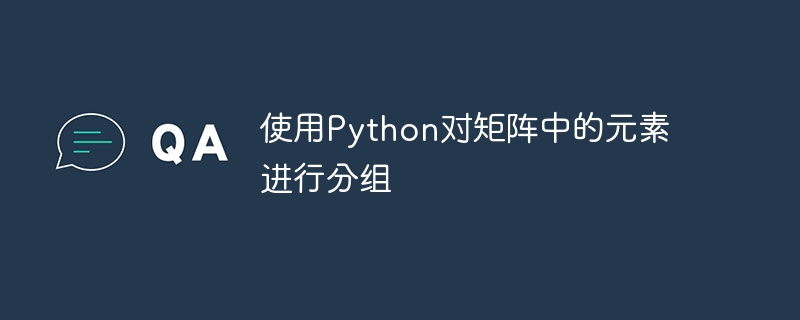使用Python將矩陣中的元素進行分組
- 王林轉載
- 2023-08-28 14:01:06635瀏覽

矩陣廣泛應用於各個領域,包括數學、物理和電腦科學。在某些情況下,我們需要根據某些標準將矩陣的元素進行分組。我們可以依照行、列、值、條件等對矩陣的元素進行分組。在本文中,我們將了解如何使用 Python 對矩陣的元素進行分組。
建立矩陣
在深入研究分組方法之前,我們可以先在 Python 中建立一個矩陣。我們可以使用 NumPy 函式庫有效地處理矩陣。以下是我們如何使用 NumPy 建立矩陣:
範例
下面的程式碼建立一個 3x3 矩陣,其值範圍為 1 到 9。
import numpy as np
# Creating a 3x3 matrix
matrix = np.array([[1, 2, 3],
[4, 5, 6],
[7, 8, 9]])
print(matrix)
輸出
[[1 2 3] [4 5 6] [7 8 9]]
按行或列將元素分組
將矩陣中的元素分組的最簡單方法是按行或列。我們可以使用 Python 中的索引輕鬆實現這一點。
按行分組
要按行將元素分組,我們可以使用索引符號矩陣[row_index]。例如,要將矩陣中的第二行分組,我們可以使用matrix[1]。
文法
matrix[row_index]
這裡,矩陣是指我們要從中提取特定行的矩陣或陣列的名稱。 row_index 表示我們要存取的行的索引。在Python中,索引從0開始,因此第一行稱為0,第二行稱為1,依此類推。
範例
import numpy as np
# Creating a 3x3 matrix
matrix = np.array([[1, 2, 3],
[4, 5, 6],
[7, 8, 9]])
row_index = 1
grouped_row = matrix[row_index]
print(grouped_row)
輸出
[4 5 6]
按列分組
要按列將元素分組,我們可以使用索引符號矩陣[:,column_index]。例如,要將矩陣中的第三列分組,我們可以使用matrix[:, 2]。
範例
import numpy as np
# Creating a 3x3 matrix
matrix = np.array([[1, 2, 3],
[4, 5, 6],
[7, 8, 9]])
column_index = 2
grouped_column = matrix[:, column_index]
print(grouped_column)
輸出
[3 6 9]
依條件將元素分組
在許多情況下,我們需要根據某些標準而不是按行或列對元素進行分組。我們將探索兩種方法來實現這一目標:按值分組和按條件分組。
按值分組
要根據值將矩陣中的元素分組,我們可以使用 NumPy 的 where 函數。按值對矩陣中的元素進行分組使我們能夠輕鬆識別和提取感興趣的特定元素。當我們需要分析或操作矩陣中具有某些值的元素時,此方法特別有用。
文法
np.where(condition[, x, y])
Here,the condition is the condition to be evaluated. It can be a boolean array or an expression that returns a boolean array. x (optional): The value(s) to be returned where the condition is True. It can be a scalar or an array−like object. y (optional): The value(s) to be returned where the condition is False. It can be a scalar or an array−like object.
##範例
import numpy as np
# Creating a 3x3 matrix
matrix = np.array([[1, 2, 3],
[4, 5, 6],
[7, 8, 9]])
value = 2
grouped_elements = np.where(matrix == value)
print(grouped_elements)
輸出
(array([0]), array([1]))
依條件分組也可以使用 NumPy 的 where 函數根據特定條件將矩陣中的元素分組。讓我們考慮一個範例,我們要將所有大於 5 的元素分組。
文法
np.where(condition[, x, y])
Here,the condition is the condition to be evaluated. It can be a boolean array or an expression that returns a boolean array. x (optional): The value(s) to be returned where the condition is True. It can be a scalar or an array−like object. y (optional): The value(s) to be returned where the condition is False. It can be a scalar or an array−like object.##範例
import numpy as np
# Creating a 3x3 matrix
matrix = np.array([[1, 2, 3],
[4, 5, 6],
[7, 8, 9]])
condition = matrix > 5
grouped_elements = np.where(condition)
print(grouped_elements)
輸出
(array([1, 2, 2, 2]), array([2, 0, 1, 2]))
透過迭代將元素分組
對矩陣中的元素進行分組的另一種方法是迭代其行或列並收集所需的元素。這種方法使我們能夠更靈活地對分組元素執行附加操作。
文法
list_name.append(element)
Here, the append() function is a list method used to add an element to the end of the list_name. It modifies the original list by adding the specified element as a new item.
示例
import numpy as np
# Creating a 3x3 matrix
matrix = np.array([[1, 2, 3],
[4, 5, 6],
[7, 8, 9]])
grouped_rows = []
for row in matrix:
grouped_rows.append(row)
print(grouped_rows)
輸出
[array([1, 2, 3]), array([4, 5, 6]), array([7, 8, 9])]
結論
在本文中,我們討論如何使用 Python 內建函數對矩陣中的不同元素進行分組,我們首先使用 NumPy 函式庫建立矩陣,然後討論各種分組技術。我們介紹了按行和列分組,以及使用 NumPy 中的 where 函數按值和條件分組。
以上是使用Python將矩陣中的元素進行分組的詳細內容。更多資訊請關注PHP中文網其他相關文章!

